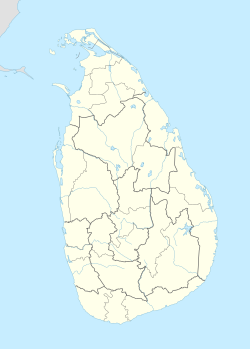Talawakelle
Talawakelle තලවාකැලේ தலவாக்கலை | |
|---|---|
 Mlesna tea castle, Talawakelle | |
| Coordinates: 6°56′00″N 80°39′00″E / 6.93333°N 80.65000°E | |
| Country | Sri Lanka |
| Province | Central Province |
| Time zone | UTC+5:30 (Sri Lanka Standard Time Zone) |
| • Summer (DST) | UTC+5:30 (Summer time) |
Talawakelle (Sinhala: තලවාකැලේ, Tamil: தலவாக்கலை) is a town in Nuwara Eliya District in the Central Province, Sri Lanka, governed by an Urban Council. It is the centre of the Dimbula tea planting district, the largest tea growing area in Sri Lanka.[1] It is situated on A7 Colombo-Nuwara Eliya highway. The altitude of Talawakelle is 1,198 metres (3,930 ft). Talawakelle railway station is one of the major stops of Udarata (Sinhala "Hill Country") or Main railway line. The town is administered by Talawakelle-Lindula urban council.
Located in the Colombo-Badulla railway line, and Avissawella - Nuware Eliya main Road (A7) the town serves as a gateway to Tea Research Institute of Sri Lanka, Nuwara Eliya and tourists.
Climate
The mean annual temperature is around 18°C in the area and this climate is described as the perfect "tea-climate".[1]
Demography
Majority of the population of Talawakelle is Indian Tamils who are workers of neighboring tea estates. The town considered the focal point of Indian Tamil politics in Sri Lanka. Small portion of Sinhalese also live in the town.
Main schools
Schools in Talawakelle are part of the Nuwara-Eliya school district.
- Talawakelle Tamil Maha Vidyalayam - Tamil Medium
- Sumana Secondary School is a provincial school for grades 6 through 13. It has an Advanced Science track. Instruction is done in both Sinhala and English.[2]
- St. Patrick's College, Talawakelle - Tamil Medium
Visitor attractions
There are two waterfalls situated around Talawakelle area. Both the waterfalls formed by Kothmale Oya, which runs through the town.
Post and telephone
- Sri Lanka 00 94
- Area code 052
- Postal code 22100
Upper Kothmale Project
The last major hydro-electricity project in Sri Lanka, Upper Kotmale Dam, is currently underway near the town of Talawakelle.[3] The project drew many a protests from environmentalists[4] and local residents. Owing to threatened existence of St. Clair's Falls and fear of losing or submerging their homes to the dam.
Notes
- ^ a b Cave: p. 133
- ^ List of Government Schools (as at March 1, 2016) (PDF). Ministry of Education (Sri Lanka). p. 40. The school has census no. 05002.
- ^ "Construction of water tunnel begins next month". Daily news Online. The Associated Newspapers of Ceylon Ltd. 19 March 2007. Archived from the original on 4 June 2011. Retrieved 2009-01-15.
- ^ "Japan to Fund Sri Lankan government to destroy her best Mountains and Waterfalls". greens.org. Retrieved 2008-09-05.
References
- W.Cave, Henry (2003). Ceylon along the Rail Track (2nd Visidunu ed.). Visidunu Publishers. ISBN 955-9170-46-5.

